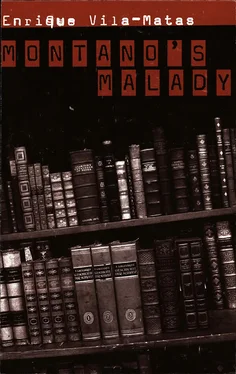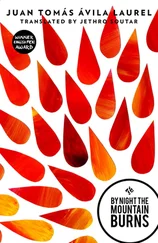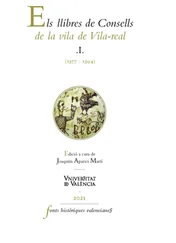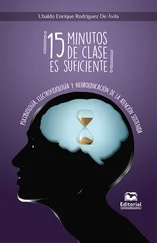I was so annoyed with my son that I was on the verge of telling him that I would sing on the day that I dug his grave. But it didn’t seem a good idea to add fuel to the flames. However, I did ask him what on earth the matter was, and told him that I had never seen him acting so strange. I already had it clear in my mind that, according to his response, I should make a swift exit before he had a chance to administer the lethal dose.
“You’re the one who’s acting strange;” he said. “You come to Nantes and tell me you’re literature-sick, which is pretty obvious, and then you start asking me about the sea and Duchamp.” I immediately regretted having confessed so freely yesterday that I felt saturated with so many books and so many quotations. I’m very glad I didn’t, but I was about to elaborate on yesterday’s confession by telling him that since arriving in Nantes I have felt trapped in the pages of a novel that I am copying down in my diary and whose enigmatic rhythm is being marked, with noticeable regularity, by Montano’s malady.
In the end the tension in La Cigale became so great that I told Aline and my son that I was walking back to the hotel and would come and see them in the bookshop at the end of the day.
I prepared my suitcase an hour ago. I shall finish writing these lines in my diary and then go to the station, where I shall take the first train out of this city. I shall leave on the first train. I know that this is a very literary thing to do, I also know that trains are very literary, but it does not matter, on the first train I find, I shall leave Nantes, I shall leave and let my son sing while he digs the grave of whomever he likes, so long as it isn’t mine.
* * *
The train steals out of Nantes, I am leaving Verne’s city behind, the relief is immense. In his diaries Ernst Jünger says that people with dilated pupils soon arouse distrust. I would add to this that sons, especially if they turn so exceedingly dangerous as mine, come into the world just to aggravate their fathers’ illnesses, sometimes just to kill them. It is supposed to be a fact of life, that some die so that others can be born. But I do not wish to die of a literary overdose, nor do I have any desire to suffer vengeance by Hamlet’s sword. I have no problem with the father being killed, just so long as I’m not the father.
I am leaving Nantes, abandoning the Danish court.
Even if I discovered now that my son is the sanest person in the world and I am simply odd, it would not change anything, I would still leave Nantes, because it is clear that my son, whether he is innocent or a dangerous killer, has not stopped aggravating my literary illness since I arrived in this city. I am sure that, had I stayed a few hours longer in Nantes, I would have ended up — if I haven’t already — turning into the most literary being on earth.
The distance swallows up Nantes, elegant provincial city with its river, a city exposed to the four winds, an open city and yet, also, an enclosed city, a literary city: Verne, Vaché, and Julien Gracq among others were born here or hereabouts.
Very soon I shall start thinking about tomatoes and asparagus and all sorts of natural products of the earth and I shall forget about so much literature. At least for a time, I need to have a complete break from literature, to rest in whatever way I can. Also, even if it is only for a short period, I am going to shelve this diary that was turning into a novel. I need to concentrate my mind on natural things, to meditate on whatever claptrap comes into my head, which I cannot easily relate to literature. “It is possible to speak of a writing malady,” I remember now that Marguerite Duras wrote. I wish to escape from such a malady for a good long while.
That’s enough literature for now. Fortunately, dangerous Nantes recedes into the distance. I am going to watch the countryside and look out for silly cows grazing in green meadows under the pretty rain. Anything that isn’t writing or thinking in literary terms. I feel sorry for Montano, he may have had high hopes for me. But he can find himself another victim, not me. He can sing while he digs another’s grave.
At the end of the twentieth century, I went to Valparaiso to think about explosions. It isn’t that I went to this Chilean port with this express purpose in mind, but circumstances combined in such a way that on New Year’s Eve, on the hanging terrace of the Brighton Hôtel, watching the fireworks that saw out the century, I ended up having the impression that fate had secretly planned it so that I would travel to Valparaiso to think about explosions. And about death, I should add. Explosions and death more than anything occupied my thoughts there on the hanging terrace of the Brighton Hotel, as I contemplated the water of the bay, which at that moment was a smoking black plate, in the pleasant company of Margot and Tongoy.
I had gone to Chile under Rosa’s strict orders. She was so tired of me that she had asked me to go as far away as possible for a few days. “To Chile,” she said, “Chile, for example.” There was the delightful Margot Valerí, our intrepid aviator friend. She could help me, Rosa said. Among Margot’s many attributes was the fact that she did not have a clue about literature and she never spoke about books.
I traveled to Chile one day before the end of the century, and I went to this country without this diary that was turning into a novel, I went to Chile with the intention of not reading or writing at all, purely to see the Pacific Ocean for the first time in my life, to see its famous violent blue color and to think about anything that I could not relate to literature or to death, which was what I thought about most since forcing myself not to think about literature.
Rosa came with me to the airport and gave me a big kiss good-bye. “Off you go,” she said, “come back when you’re well.” The days prior to my departure had been absolute hell for her. After my brief stay in Nantes, I had returned to Barcelona in a worse state than when I had left. From Nantes I could have gone to Paris, which would have been the most sensible thing to do, but I had been an idiot and taken the first train to appear in Nantes station — that idea of the “first train” has always been as literary and romantic as it is pernicious — and a few hours later, fool that I am, I was back in Barcelona, where, because I did not allow myself to think about anything referring to literature, the days became empty and devoid of meaning and I ended up thinking about death, which is precisely what literature talks about most.
I thought about death even when I was asleep. One afternoon, in the sitting room at home, I told myself that it would be better to try reading a book again than to switch on the television and watch those programs about the lives of the rich and famous, which, while they did not refer me to literature, made me so anxious that I always fell to thinking about death. However, my choice of a book was not a good one. With my eyes closed, I picked a book from the shelf and found myself with a biography of the writer Sir Thomas Browne, whom initially, I do not know why, I imagined to be a jovial lover of life. But in a matter of seconds I was more anxious than ever, having read that on one particular occasion Browne imagined seeing sleeping bodies from on high and suggested that, if one were to pass across the globe, following the setting sun, one would see the whole world as a vast city of the dead.
Anxiety everywhere! I put down the book, threw it on the floor as if it burned, and switched on the television again. They were showing a soccer game and focusing on the pained expression of a player lying sprawled on the turf. Anxiety everywhere, I went back to thinking about death.
Every day in Barcelona became horrible, very morbid. I would cry in my sleep and then wake up and tell Rosa that it was nothing, really, Rosa, just a dream or something like that, nothing, Rosa. But it was not a dream or even a nightmare, it was a mournful voice, I knew this very well, a voice that even at night prowled about me and told me that I was going to die and that I didn’t have long to live. I would wake up in the night and tell Rosa that it was nothing, just a dream, but shortly thereafter I would go to the kitchen to have a drink. Rosa would follow me to the kitchen and, as soon as she caught me with a bottle of something, she would tell me that I was in a very bad way, that it would even be better for me to start writing reviews again and to think about literature, or else to travel, yes, to travel to a faraway country, I needed it. And I would stand there, openmouthed and sad, staring silently at the kitchen calendar.
Читать дальше












